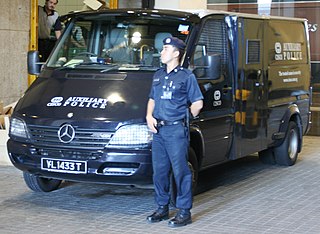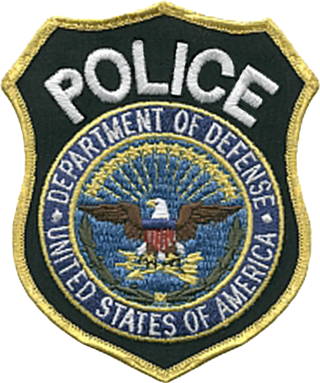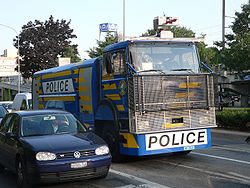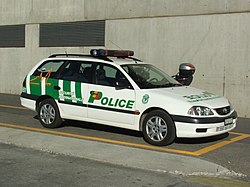Law enforcement agencies
Federal
The federal government does not run a general purpose law enforcement agency. National-level law enforcement coordination is provided by a board of cantonal police commanders.
The Federal Office of Police, an organisation belonging to the Federal Department of Justice and Police, coordinates international operations and may request cantonal police support for criminal investigations conducted under federal jurisdiction (such as with respect to organised crime, money laundering and terrorism). The Office's investigative arm is the Federal Criminal Police, which operates a small special operations unit, Task Force TIGRIS, whose existence was not made public until 2009.
The Federal Department of Finance is responsible for the Swiss Border Guard Corps. The military of Switzerland, led by the Federal Department of Defence, Civil Protection and Sports, operates a professional military security service and a military police service.
These services, as well as the armed forces in general, can be tasked to support the cantonal police forces in situations where civilian police resources are insufficient, such as catastrophes or large-scale unrest. In this case, the military serves under cantonal civilian responsibility and command.
An actual Swiss Railway Police did not exist until the late 1990s. Prior to this, a number of train attendants were sworn in, equipped with a sidearm and ordered to provide security services in addition to their main duties. In the early 1990s, internal employees were recruited into a security force called Bahnpolizei (Bapo) or Railway Police, responsible for the safety on the S-Bahn, the public suburban railway network in Zurich. Its officers were equipped with a baton and a pepper spray but were not allowed to carry a firearm and had very limited authority. In the meantime, the Swiss Federal Railways SBB and Securitas AG established the Public Transport Security Services Securitrans AG, where the Bapo was subsequently embedded in. With the passage of the Federal Act on the Security Units of Public Transport Companies in 2010, the Railway Police returned under SBB’s umbrella and was renamed to Transport Police for legal reasons. In 2012, the Ordinance on the Security Units of Public Transport Companies was issued that extended the Transport Police's authority and allowed its officers to carry a sidearm. Today, the Transport Police and Securitrans coexist with different fields of duty.
Cantonal
The 26 cantonal police agencies and numerous municipal police agencies are the backbone of Swiss law enforcement. They are not subordinate to federal authorities. Their commanding officers report to the head of the respective cantonal or municipal department of police, who is a member of the cantonal or municipal governing council.
Police training is conducted in cantonal service academies and at the Interkantonale Polizeischule Hitzkirch, a joint police academy of twelve police agencies established in 2007.
Private
Several private security services such as Securitas AG and Protectas exist in Switzerland. Their agents (except those of the railway police service as noted above) do not have any law enforcement authority, such as the power of arrest, beyond that of ordinary citizens.

Law enforcement is the activity of some members of government who act in an organized manner to enforce the law by discovering, investigating, deterring, rehabilitating, or punishing people who violate the rules and norms governing that society. The term encompasses police, courts, and corrections. These three components of the criminal Justice system may operate independently of each other or collectively through the use of record sharing and cooperation. Throughout the world, law enforcement are also associated with protecting the public, life, property, and keeping the peace in society.
Railroad police or railway police are people responsible for the protection of railroad properties, facilities, revenue, equipment, and personnel, as well as carried passengers and cargo. Railroad police may also patrol public rail transit systems.

Transit police are specialized police agencies employed either by a common carrier, such as a transit district, railway, railroad, bus line, or another mass transit provider or municipality, county, district, or state.

Securitas AG is a Swiss company providing security services with head office in Zollikofen, regional offices in Basel, Bern, Geneva, Lausanne, Lugano, Lucerne, Neuchâtel, Olten, St. Gallen, Thun and Zürich as well as 25 other branches all over Switzerland.

Law enforcement in Germany is constitutionally vested solely with the states, which is one of the main features of the German political system.

Law enforcement in Canada is the responsibility of police services, special constabularies, and civil law enforcement agencies, which are operated by every level of government, some private and Crown corporations, and First Nations. In contrast to the United States or Mexico, and with the exception of the Unité permanente anticorruption in Quebec and the Organized Crime Agency of British Columbia, there are no organizations dedicated exclusively to the investigation of criminal activity in Canada. Criminal investigations are instead conducted by police services, which maintain specialized criminal investigation units in addition to their mandate for emergency response and general community safety.

Provosts are military police (MP) whose duties are policing solely within the armed forces of a country, as opposed to gendarmerie duties in the civilian population. However, many countries use their gendarmerie for provost duties.
Law enforcement in Spain is carried out by numerous organizations, not all of which operate in the same areas.

Law enforcement in Austria is the responsibility of the Directorate General for Public Security, a subdivision of the Federal Ministry of the Interior located at Herrengasse 7 in Vienna. Over 20,000 police officers are on duty in the Federal Police at more than 1,000 police stations. On lakes and rivers the federal police has over 70 boats and other craft to act as the water police.
Bahnpolizei is the term in Germany, Austria and the German-speaking parts of Switzerland for the Railway police.

The British Columbia Sheriff Service (BCSS) is a provincial law enforcement agency overseen by the Ministry of the Attorney General in the province of British Columbia, Canada. Founded in 1857, it is the oldest law enforcement agency in the province. Sheriffs are provincial peace officers appointed under the BC Sheriff Act and BC Police Act with authority to enforce all relevant federal and provincial acts, including the criminal code throughout British Columbia while in the lawful execution of their duties.

Private police or special police are types of law enforcement agencies owned and/or controlled by non-government entities. Additionally, the term can refer to an off-duty police officer while working for a private entity, providing security, or otherwise performing law enforcement-related services; officers engaging in private police work have the power to enforce the law, however, terminology and authority vary by jurisdiction.

Airport police units are a security police agency assigned to perform law enforcement functions at airports. They provide a wide range of law enforcement duties and responsibilities including patrol, investigation, traffic flow management, and control and response to airport emergencies. Airport police provide enhanced safety to airport employees, and to passengers. Officers can be found at security gates, throughout the terminal area, and around the airport’s perimeter.

In many countries, particularly those with a federal system of government, there may be several law enforcement agencies, police or police-like organizations, each serving different levels of government and enforcing different subsets of the applicable law.

A bylaw enforcement officer is an employee of a municipality, county or regional district, charged with the enforcement of local ordinance—bylaws, laws, codes, or regulations enacted by local governments. Bylaw enforcement officers often work closely with police and other law enforcement agencies, but are generally not considered emergency services.

United States Department of Defense Police are the uniformed civilian security police officers of the United States Department of Defense (DoD), various branches of the United States Armed Forces, or DoD agencies.

The cantonal police are the law enforcement agencies for each of the 26 cantons of Switzerland. Law enforcement in Switzerland is mainly a responsibility of the cantons, each operating cantonal police agencies. Some cities also operate municipal police agencies as provided for by cantonal law.

Law enforcement in Mexico is divided between federal, state, and municipal agencies. There are two federal police forces, 31 state police forces including two for Mexico City, and 1,807 municipal police forces. There are 366 officers per 100,000 people, which equals approximately 500,000 in total.
A private police force, or private police department, in the United States is a law enforcement agency that is:
A law enforcement agency (LEA) is any government agency responsible for law enforcement within a specific jurisdiction through the employment and deployment of law enforcement officers and their resources. The most common type of law enforcement agency is the police, but various other forms exist as well, including agencies that focus on specific legal violation, or are organized and overseen by certain authorities. They typically have various powers and legal rights to allow them to perform their duties, such as the power of arrest and the use of force.


















